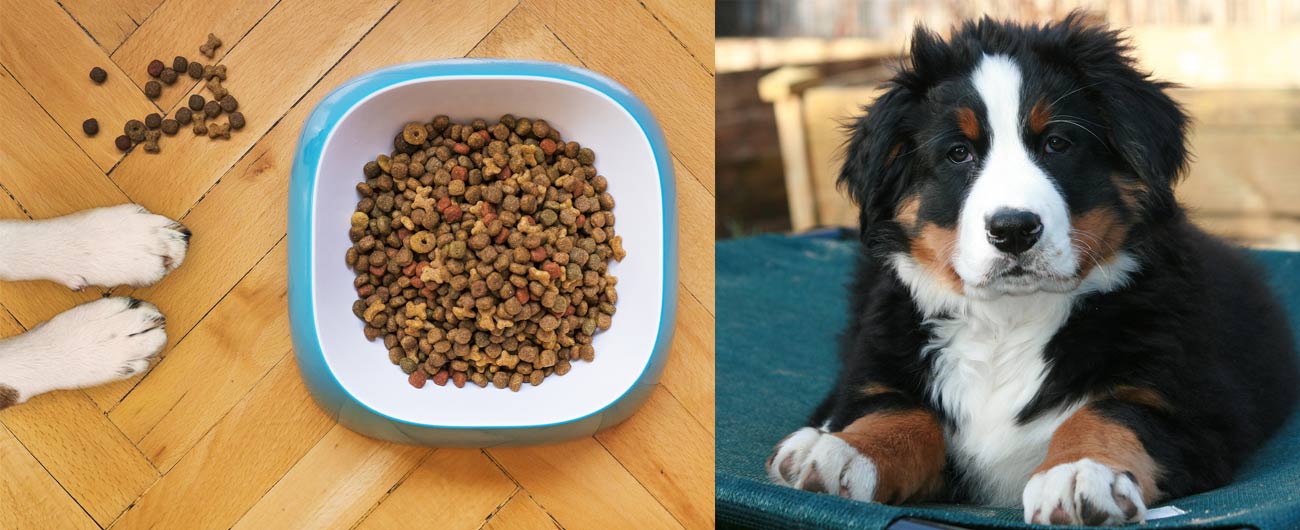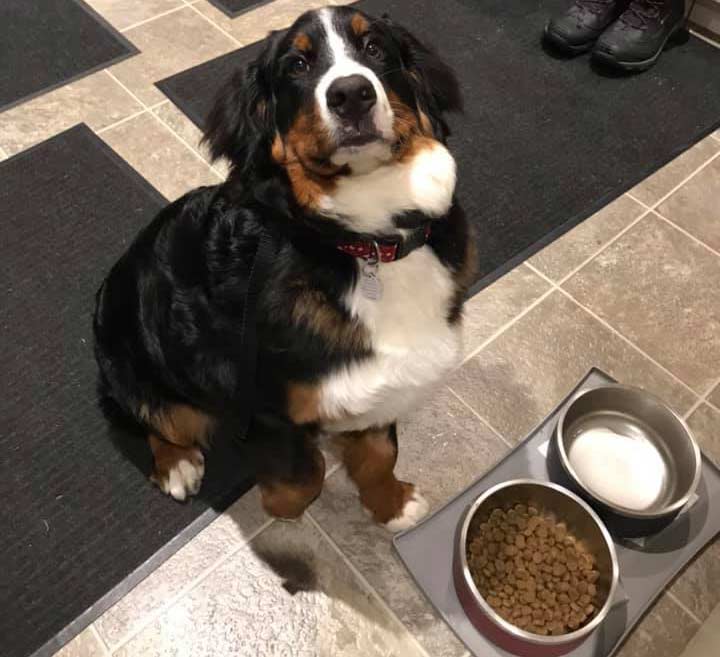Are you wondering what to feed your Bernese Mountain Dog? Well, you’ve come to the right place! Feeding your furry friend is an essential part of their well-being, and getting it right is crucial. So, let’s dive in and discover what makes the perfect meal for your Bernese buddy!
Now, when it comes to feeding a Bernese Mountain Dog, there are a few key factors to consider. These gentle giants have unique nutritional needs due to their large size and active lifestyle. It’s essential to provide them with a balanced diet that supports their growth, energy levels, and overall health. So, let’s talk about what types of food are best suited for these lovable canines.
When selecting a diet for your Bernese Mountain Dog, opt for high-quality dog food that incorporates wholesome ingredients. Look for products that contain real meat, whole grains, and a good balance of essential nutrients. It’s important to avoid fillers or artificial additives that can be harmful to your pup’s health. And don’t forget to provide plenty of fresh water throughout the day to keep your Bernese hydrated!
Now that you have a basic understanding of what to look for in your Bernese Mountain Dog’s diet, let’s explore some specific food options that can keep them healthy, happy, and wagging their tails. From commercial dog foods to homemade meals and even occasional treats, we’ll cover it all. So, get ready to become a food guru for your Bernese Mountain Dog! Let’s dive into the world of delicious and nutritious meals together!
A Bernese Mountain Dog requires a balanced diet to thrive. Provide your furry friend with high-quality dog food that is specially formulated for large breed dogs. Look for a brand that features real meat as the first ingredient, avoids fillers and artificial additives, and provides essential nutrients like protein, fat, carbohydrates, vitamins, and minerals. Consult with your veterinarian for personalized recommendations based on your dog’s age, weight, and activity level.

What to Feed a Bernese Mountain Dog: A Guide to Proper Nutrition
In this article, we will explore the essential aspects of feeding a Bernese Mountain Dog, including the best diet for their health and well-being. As a responsible pet owner, it is crucial to provide your Bernese Mountain Dog with a balanced and nutritious diet to support their active lifestyle. By understanding their dietary needs and selecting the right food, you can ensure your beloved furry friend stays healthy and happy.
Bernese Mountain Dog Nutritional Requirements
When it comes to feeding a Bernese Mountain Dog, it is crucial to consider their unique nutritional requirements. These gentle giants have specific dietary needs due to their large size and active nature. To ensure optimal health, it is essential to provide them with a balanced diet that includes high-quality proteins, healthy fats, complex carbohydrates, and essential vitamins and minerals.
Proteins are especially important for Bernese Mountain Dogs as they are a vital source of energy and help in the development and maintenance of strong muscles and tissues. Look for dog food that lists high-quality animal proteins such as chicken, turkey, or fish as the main ingredients.
In addition to proteins, healthy fats are essential for your Bernese Mountain Dog’s overall health. Fats provide a concentrated source of energy, promote healthy skin and coat, and aid in the absorption of fat-soluble vitamins. Opt for dog food that contains sources of healthy fats such as salmon oil or flaxseed oil.
Choosing the Right Dog Food
With so many options available in the market, it can be overwhelming to choose the right food for your Bernese Mountain Dog. Here are a few key considerations to keep in mind:
- Look for complete and balanced dog food: Ensure that the dog food you choose is labeled as “complete and balanced” or “formulated to meet the nutritional levels established by the AAFCO Dog Food Nutrient Profiles.” This ensures that the food contains all the necessary nutrients your dog needs.
- Consider life stages and special dietary needs: Bernese Mountain Dogs have different nutritional needs at different life stages. Choose food specifically formulated for puppies, adult dogs, or senior dogs. If your dog has any special dietary needs or sensitivities, consult with your veterinarian to find the appropriate food.
- Avoid artificial additives and fillers: Read the ingredient list carefully and avoid dog food that contains artificial additives, preservatives, and fillers like corn, wheat, and soy. These ingredients can cause allergies or digestive issues.
Feeding Schedule and Portion Control
Establishing a consistent feeding schedule and controlling portion sizes are crucial to maintaining your Bernese Mountain Dog’s ideal weight and overall health. Here are some tips to keep in mind:
- Divide the daily recommended amount of food into two or three meals.
- Avoid free-feeding or leaving food out all day to prevent overeating.
- Consult with your veterinarian to determine the appropriate portion sizes based on your dog’s age, weight, and activity level.
- Monitor your dog’s body condition and adjust portion sizes accordingly. Avoid overfeeding, as obesity can lead to various health problems.
Common Dietary Issues in Bernese Mountain Dogs
As a Bernese Mountain Dog owner, it is essential to be aware of common dietary issues that may arise in this breed. By recognizing these issues early on, you can take appropriate measures to address them and ensure your dog’s proper nutrition:
Food Allergies and Sensitivities
Bernese Mountain Dogs may develop allergies or sensitivities to certain ingredients in their food. Common allergens include grains, chicken, beef, and dairy. If you notice symptoms such as itching, gastrointestinal upset, or skin issues, consult with your veterinarian to identify the culprit and switch to a hypoallergenic diet if necessary.
Bloat
Bloat, also known as gastric dilatation-volvulus, is a serious and potentially life-threatening condition that can occur in large dog breeds like Bernese Mountain Dogs. Feeding them smaller meals throughout the day and using elevated feeders can help reduce the risk of bloat.
Joint Health
Bernese Mountain Dogs are prone to joint issues such as hip dysplasia and arthritis. Providing them with a diet rich in glucosamine and chondroitin, which support joint health, can be beneficial. Look for dog food formulated specifically for joint health or consider supplements recommended by your veterinarian.
Conclusion
In conclusion, feeding a Bernese Mountain Dog requires careful consideration of their nutritional needs. By choosing a dog food that meets their dietary requirements, establishing a feeding schedule, and monitoring portion sizes, you can ensure your Bernese Mountain Dog stays healthy and happy. However, it is crucial to consult with your veterinarian for personalized advice and guidance based on your dog’s specific needs. Remember, a well-balanced diet is the foundation of good health for your furry friend.
Key Takeaways: What to Feed a Bernese Mountain Dog
- Choose a high-quality, balanced dog food specifically formulated for large breeds like Bernese Mountain Dogs.
- Ensure the food contains a good balance of protein, fats, and carbohydrates to support their active lifestyle.
- Avoid artificial additives, fillers, and by-products in the ingredients list.
- Consider incorporating fresh fruits and vegetables as healthy supplements to their diet.
- Consult with your veterinarian to determine the appropriate feeding schedule and portion sizes for your Bernese Mountain Dog.
Frequently Asked Questions
In this section, we will answer some common questions about feeding a Bernese Mountain Dog.
Q: What are the nutritional requirements of a Bernese Mountain Dog?
A: Bernese Mountain Dogs have specific nutritional needs to support their large size and active lifestyle. They require a balanced diet that includes high-quality proteins, healthy fats, carbohydrates, vitamins, and minerals. Consult with a veterinarian to determine the right amount of calories and nutrients for your specific dog.
It’s important to feed them a diet that is appropriate for their age and size, taking into consideration any health conditions or allergies they may have. Providing a diet that meets their nutritional needs will help keep them healthy and prevent common issues like obesity or joint problems.
Q: Should I feed my Bernese Mountain Dog a commercial diet or a homemade diet?
A: Both commercial diets and homemade diets can be appropriate for Bernese Mountain Dogs as long as they meet their nutritional requirements. Commercial dog food can provide a balanced diet as long as you choose a high-quality brand that uses real meat as the main ingredient, without fillers or artificial additives.
If you prefer to feed your dog a homemade diet, it’s crucial to work with a veterinary nutritionist to ensure your dog is receiving all the necessary nutrients. Homemade diets require careful planning and monitoring to avoid deficiencies or excesses in certain nutrients. Your veterinary nutritionist can help create a customized diet plan for your Bernese Mountain Dog.
Q: How often should I feed my Bernese Mountain Dog?
A: Puppies should be fed more frequently than adult dogs. From 8 weeks to 4 months, provide 3 to 4 meals a day. From 4 months to a year, reduce to 3 meals a day. Once your Bernese Mountain Dog is 1 year old, you can switch to feeding them 2 meals a day: one in the morning and one in the evening.
Always follow the feeding guidelines provided by the dog food manufacturer and adjust the portion sizes based on your dog’s individual needs, activity level, and overall health. Regularly monitor your dog’s weight and consult with your vet if you have any concerns.
Q: Can I give my Bernese Mountain Dog human food as treats?
A: While it’s tempting to share your food with your furry friend, not all human food is safe for dogs. Some foods can be toxic or cause digestive upset. It’s best to stick to dog-specific treats or foods recommended by your veterinarian.
If you want to give your Bernese Mountain Dog a special treat, opt for dog-safe fruits and vegetables like apples, carrots, or green beans. Always introduce new foods gradually and monitor your dog for any adverse reactions. And remember, treats should only make up a small portion of your dog’s overall diet.
Q: How do I transition my Bernese Mountain Dog to a new diet?
A: It’s important to transition your Bernese Mountain Dog to a new diet gradually to avoid digestive upset. Start by mixing a small amount of the new food with their current food, gradually increasing the proportion of the new food over the course of about a week.
Monitor your dog’s stool during the transition. If you notice any loose stools or other signs of digestive issues, slow down the transition process or consult with your veterinarian. Remember to always introduce new foods and diets slowly to give your dog’s digestive system time to adjust.

Summary:
When it comes to feeding a Bernese Mountain Dog, it’s important to choose a high-quality dog food that meets their specific nutritional needs. Look for a balanced diet with protein, healthy fats, and carbohydrates. Avoid foods that can be harmful, like chocolate and grapes. Always provide fresh water and portion their meals according to their age, weight, and activity level. Remember to consult with your veterinarian for personalized advice and make gradual changes to their diet to avoid digestive issues. Don’t forget to give them treats in moderation and keep an eye on their weight to ensure they stay healthy and happy.
In addition to a nutritious diet, regular exercise is crucial for a Bernese Mountain Dog to maintain a healthy weight and prevent boredom. Take them for daily walks and engage in playtime activities. Lastly, give them plenty of love and attention as they are loyal and affectionate companions who deserve the best care possible.
